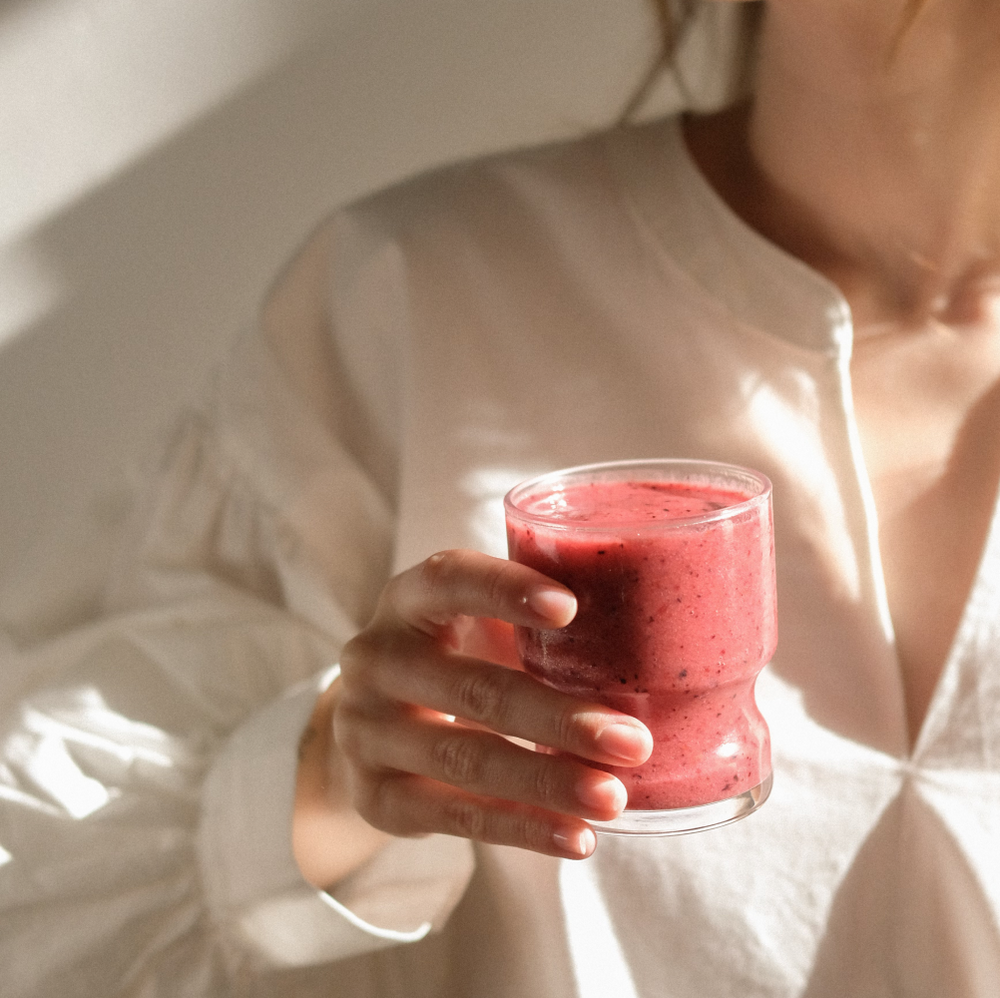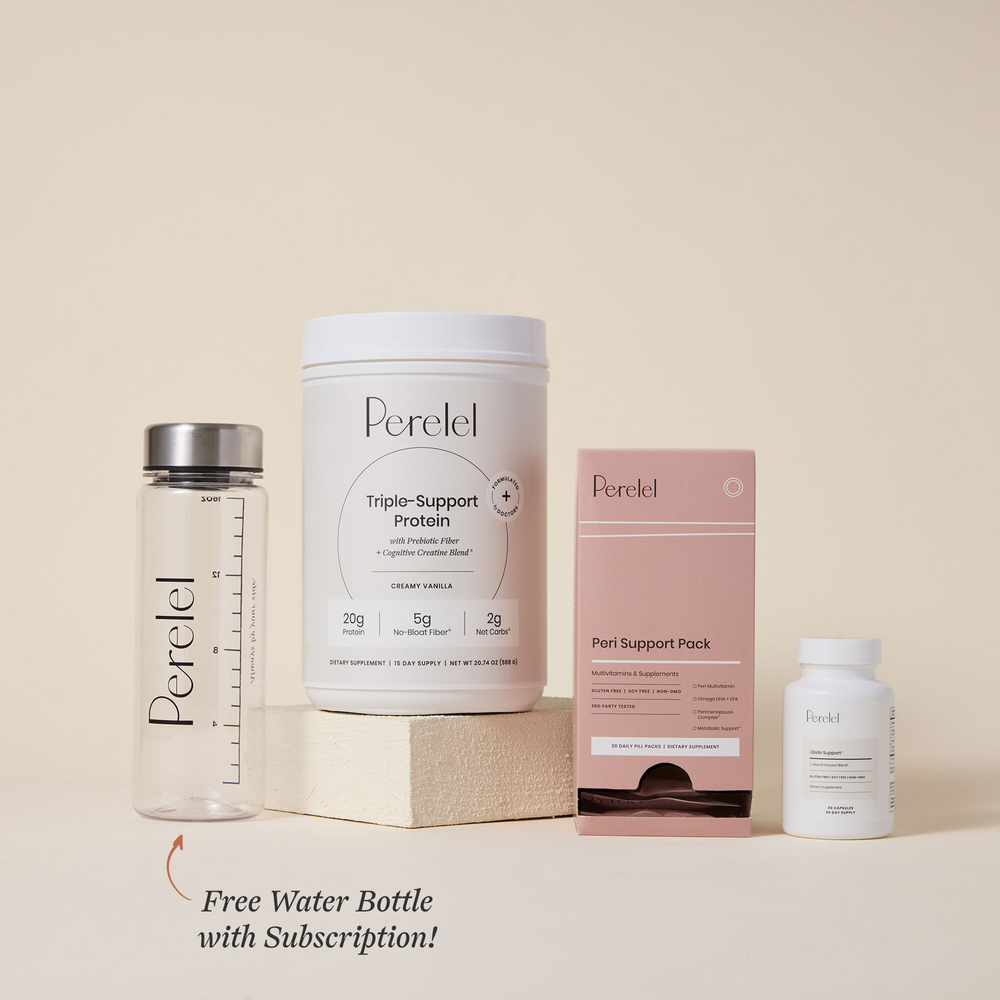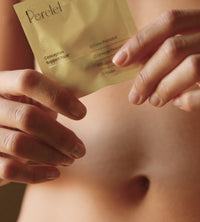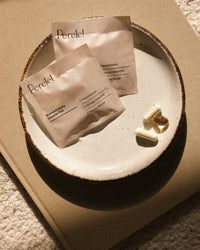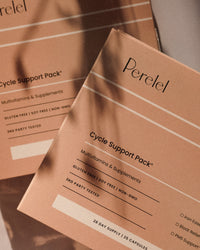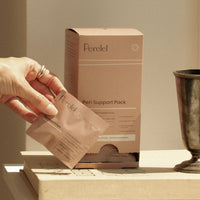At Perelel, we don’t believe in choosing between cravings and nourishment—you deserve both. That’s why we turned to Brigit Hadam, RD—our in-house dietitian and Senior Manager of Scientific Affairs—to craft a recipe that delivers a sweet, creamy moment and a solid 20 grams of protein in one glass. The result? The PB & Berry Smoothie with a creamy vanilla twist thanks to the starring ingredient: Triple-Support Protein.
Why Protein Matters—Especially for Women
Protein isn’t just for gym buffs. It’s the macronutrient that supports nearly every system in your body:
-
Hormone balance: Protein provides amino acids, the building blocks for hormones that help regulate energy, mood, and metabolism.
-
Muscle repair and tone: It helps repair muscle tissue after workouts or long days of “mom-ing,” and supports lean muscle mass as we age.
-
Satiety & blood sugar support: A protein-rich meal helps keep you full longer and prevents sharp blood sugar spikes (which means fewer mid-afternoon crashes).
-
Skin, hair & nails: Protein provides the foundation for collagen and keratin production, keeping your beauty routine fueled from within.
Shop the Article:
Why Triple-Support Protein?
Formulated by doctors, our Triple-Support Protein is designed specifically with women in mind. One scoop brings together:
-
20 grams of protein from a balanced plant-based blend to support daily energy and recovery.
-
Functional nutrients shown to support gut, muscle, and metabolic health.
-
Clean vanilla flavor that blends seamlessly into smoothies, baked goods, or even your morning coffee.
In short: It’s not just protein. It’s protein, elevated.
The Creatine Connection
Protein isn’t the only powerhouse in your glass. Our Triple-Support Protein also includes creatine, a nutrient once reserved for athletes but now backed by growing research for women’s health. Creatine helps support muscle strength, endurance, and recovery—making it easier to keep up with your workouts and your everyday energy demands. Beyond fitness, it also plays a role in brain health and cognitive resilience, which is especially supportive during hormonally dynamic stages like perimenopause. In other words, it’s not just about building strength—it’s about building long-term vitality.
Creatine & Perimenopause: Small Scoop, Big Support
As estrogen ebbs, many women notice shifts in strength, energy, and even mood. That’s where creatine earns a spot in your routine. A women-specific research review notes that hormone changes across midlife can alter creatine kinetics—making supplementation especially relevant during and after menopause.
-
Lean strength & muscle: In adults 50+, creatine paired with resistance training consistently boosts lean mass and strength—useful insurance against midlife muscle loss.
-
Bone strength, beyond density: A two-year clinical trial in postmenopausal women found that creatine didn’t necessarily boost bone density, but it did improve walking performance and even hip bone geometry—markers of how strong and resilient bones function in real life. On the flip side, another long trial at a lower dose without exercise showed no benefit. Translation: creatine works best as a supportive partner to movement, not a solo solution.
-
Brain & mood support: The research on cognition in healthy older adults is still evolving, but the story gets more interesting for mood. In one clinical trial, women with major depressive disorder who added creatine to their SSRI regimen experienced faster, greater improvements. Larger population data echo the trend—women with higher creatine intake had lower odds of depression.
Bottom line: for perimenopausal women, creatine can be a smart, low-lift lever—especially with strength training—to support muscle, movement, and possibly mood. As always, check with your provider if it’s the right addition to your routine.
The PB & Berry Smoothie
This recipe is equal parts comfort and function—nutty from peanut butter, naturally sweet from fruit, and fresh from a handful (or two) of spinach.
Ingredients:
-
½ banana
-
½ cup berries (blueberries, strawberries, or mixed)
-
1 tablespoon peanut butter
-
2 handfuls spinach
-
1 serving Triple-Support Protein
-
1 cup almond milk
Directions:
Add all the ingredients to a blender and blend until smooth. Pour into a glass and enjoy!
References:
1. Review on creatine across women’s lifespan
Smith-Ryan, A. E., Cabre, H. E., Eckerson, J. M., & Candow, D. G. (2021). Creatine supplementation in women’s health: A lifespan perspective. Nutrients, 13(3), 877. https://doi.org/10.3390/nu13030877
2. Long-term trial in postmenopausal women (bone density & geometry)
Candow, D. G., Chilibeck, P. D., Gordon, J., Vogt, E., Landeryou, T., Kaviani, M., & Paus-Jenssen, L. (2021). A two-year randomized controlled trial of creatine supplementation and resistance exercise on bone health in postmenopausal women. Nutrients, 13(4), 1234. https://doi.org/10.3390/nu13041234
3. Creatine and antidepressant response in women
Rocha, A., Oliveira, L., Silva, C., Campos, G., de Souza, J., & Gorenstein, C. (2016). Augmentation of selective serotonin reuptake inhibitors with creatine monohydrate in women with major depressive disorder: A randomized, double-blind, placebo-controlled clinical trial. Journal of Affective Disorders, 198, 147-152. https://doi.org/10.1016/j.jad.2016.03.009
4. Dietary creatine and depression risk (population data)
Kious, B. M., Kondo, D. G., Renshaw, P. F., & Yurgelun-Todd, D. A. (2019). Dietary creatine intake and depression risk among U.S. adults. Journal of Clinical Psychiatry, 80(2), 18m12552. https://doi.org/10.4088/JCP.18m12552
This article is for informational purposes only. It is not, nor is it intended to be, a substitute for professional medical advice, diagnosis, or treatment and we recommend that you always consult with your healthcare provider. To the extent that this article features the advice of physicians or medical practitioners, the views expressed are the views of the cited expert and do not necessarily represent the views of Perelel.


